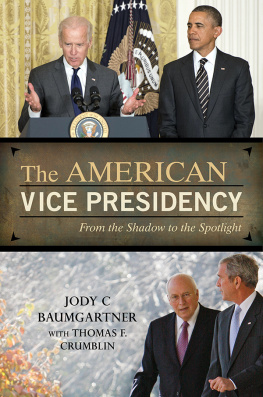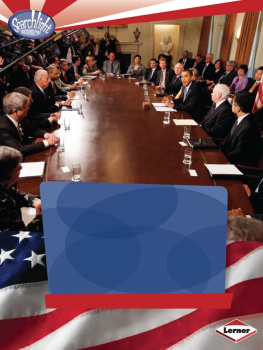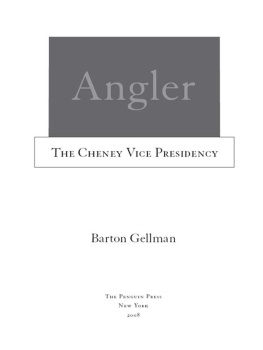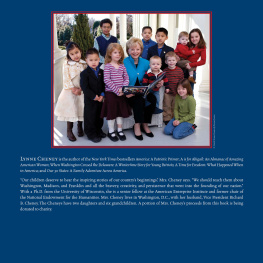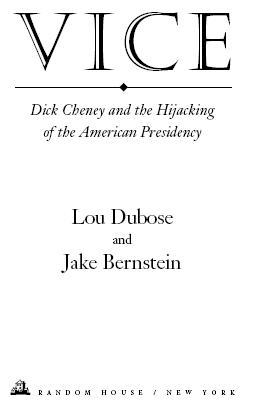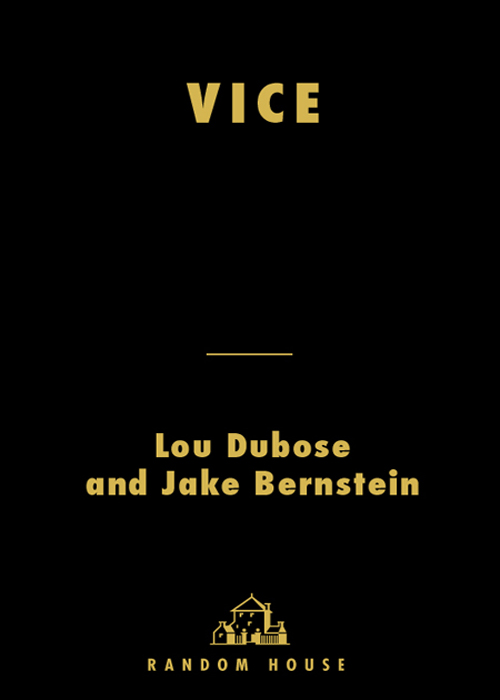
CONTENTS
To Molly Ivins,
a generous friend, wise and witty colleague,
and professional exemplar without peer
and
To Eve, thank you for being
INTRODUCTION
D ick Cheneybald, gray, avuncularstanding beside Texas governor George W. Bush in a packed hall on the University of Texas Austin campus in July 2000 was the precise image the campaign intended to convey. Bush had wrapped up a brilliant and often brutal primary campaign, yet it was hard to take him seriously. Despite months of foreign policy homeschooling, the gaffe-prone governor continued to make careless mistakes like calling Greeks Grecians, Timorese Timorians, and Kosovars Kosovarians. He told reporters that he didnt like to read long policy papers. There were press reports of hours of required downtime in the afternoon, following his long jog around Austins Town Lake. In six years as governor of Texas, Bush had failed to convince the nation that he was no longer the volatile, irresponsible first son of a political dynasty. In fact, he was perceived as a lightweight.
By selecting Cheney, Bush brought to the ticket the experience, gravitas, and wisdom he couldnt provide himself. Cheney had served three presidents, had spent ten years in Congress, and as secretary of defense had coordinated the first Gulf War. He was Bush pres preferred candidate, the Washington insider who would provide adult supervision in the White House. Nothing exciting, just competent and steady. Dick Cheney was the safe, reassuring presence whose experience would ensure that public policy, in particular foreign policy, would not careen off track.
Its unlikely that anyone watching Bush embrace his running mate on that sticky July day in Austin anticipated the power Dick Cheney would wield as vice president. Hidden was the foreign policy course Cheney planned to chart for Bush, which would lock the administration into a legacy forever defined by the war in Iraq. And while Cheney was a private man, the press had yet to realize the thick veil of secrecy behind which he would operate.
Over the course of six difficult years, Dick Cheney has become the most powerful vice president ever to occupy the office, exercising authority that often subsumes the presidents. Sources who speak about him do so at great risk and usually prefer off the record or background only. You do not want to be on the Dick Cheney blacklist, says a former congressman. He has become a shadow executive who spends too much of his time in what the media refer to as an undisclosed location and is so obsessed with privacy that while the White House, the Pentagon, and even American troops in Iraq are visible on Google Earths satellite mapping photos, the satellite image of the vice presidents residence in northwest Washington is obscured.
Cheney has the foreign policy portfolio, says a lobbyist who served in the administration of the senior Bush. Cheney has the Iraq portfolio. And he has the Congress portfolio. I dont know whats left. The answer is Not much. Six years after the governor of Texas selected the CEO of Halliburton as his running mate, his presidency has been defined by foreign policy, and Dick Cheney has done the defining.
I didnt pick Dick Cheney because of Wyomings three electoral votes, Bush said to the cheering campaign supporters who had been bused onto the University of Texas campus. I picked him because he is, without a doubt, fully capable of being the president of the United States.
In a very real sense, that is what has come to pass.
ONE
A Man, a Planand Names Named
B y mid-April 2001, Dick Cheney had been vice president of the United States for less than three months. But he was already deeply involved in a series of secret meetings in his West Wing office. When more space was needed for these energy task force meetings, an employee on loan from the Energy Department would schedule the ornate Vice Presidents Ceremonial Office in the Eisenhower Executive Office Building. The aide would also send out an e-mail designating precisely who would be allowed to attend the meetings the vice president was chairing. The April 17 list was a short one. Dick Cheney had quietly cleared his schedule to meet with a friend from Texas.
Its not likely that Dick Cheney knew at the time that Enron was collapsing. But Ken Lay knew. The Enron CEO knew that the company he built had more liabilities than assets, a grossly inflated book value, and earnings statements that had little to do with actual earnings. The last best hope for the Houston-based energy giant lay in the unregulated electricity markets out west. Enrons traders were gouging the California market, taking power plants off-line to create shortages, booking transmission lines for current that never moved, and shuttling electricity back and forth across state lines to circumvent price controls. Squeezed between what it cost them to buy power from Enron and what they could charge on the regulated retail market, one of the states two largest utility companies had filed for bankruptcy and the other had signed on to a government bailout. California was in an energy crisis unlike anything it had ever experienced. Governor Gray Davis was pleading for rate caps that would provide relief for the states devastated utility companies and the consumers enduring rolling brownouts and soaring utility bills. And Enron CEO Ken Lay was flying to Washington to talk to Dick Cheney.
The vice president was waiting. Lay handed him a three-page memo outlining Enrons recommendations for the new national energy policy Cheney was developing. Most of what Enron asked for would be included in the report the vice presidents National Energy Policy Development Group would release the following month. One of Lays recommendations was urgent, because it related to the California energy market: The administration should reject any attempt to reregulate wholesale power markets by adopting price caps.
The following day, George Skelton, a reporter at the Los Angeles Timess Sacramento bureau, got an unexpected call from a woman in the vice presidents press office asking Skelton if he wanted to interview Dick Cheney. Skelton says he thought the call might be the beginning of a campaign to make some inroads in the state Al Gore had swept in 2000. But Cheney wanted to talk energy. That was fine with Skelton, because at that time energy was the biggest story in the state. Cheney wasnt the least bit tentative. Price caps provide short-term relief for politicians, he said. But they do nothing to deal with the basic, fundamental problem. Skelton pushed a little. Would the administration support temporary price caps to get the state through the summer?
Six months? Six years? Cheney said. Once politicians can no longer resist the temptation to go with price caps, they usually are unable to even muster the courage to end themI dont see that as a possibility.
Californias governor, both U.S. senators, even Republicans in Californias House delegation were begging the administration for price caps, or for some relief for utility rates that were forcing small-business owners to close their doors. But Cheney had already told Senator Dianne Feinstein that one of the lessons he learned in the Nixon administration was that price caps dont work. Now he was calling a reporter to defend a position Ken Lay had laid out for him a day earlier. Frankly, Cheney said, California is looked on by many folks as a classic example of the kinds of problems that arise when you do use price caps. The vice president was such a free market zealot that he saw no government role in a utilities market that was savaging consumers. This was policy advocacy so fast and efficient that it seemed reflexive. Cheney heard from Ken Lay on Monday and called George Skelton on Tuesday, and Lays position on price caps was laid out under the vice presidents name in the
Next page

